Understanding Children’s Dental Anxiety
Countless families in Dubai struggle when their children experience overwhelming fear during dental appointments. This common challenge transforms routine healthcare into distressing experiences for parents and young patients alike. Research demonstrates that childhood dental experiences significantly influence adult attitudes toward oral healthcare, establishing patterns that persist throughout life.
Implementing evidence-based strategies can fundamentally alter how children perceive and respond to dental environments. The approaches detailed in this article provide actionable frameworks that have proven effective across diverse pediatric populations when consulting a pediatric dentist in Dubai.
Multiple factors contribute to pediatric dental anxiety. Environmental elements such as unfamiliar clinical settings, mechanical sounds, and intense lighting can create sensory overwhelm. Pain anticipation, whether rooted in previous experiences or peer narratives, amplifies distress and can also lead to dental phobia.
Developmental stages influence anxiety manifestation differently. Toddlers exhibit separation-related concerns. School-aged children process social information that shapes expectations. Adolescents demonstrate heightened self-consciousness regarding dental procedures.
Pre-Visit Preparation: Setting the Stage for Success
Strategic preparation substantially reduces pediatric dental anxiety in Dubai. Communication approaches require careful consideration of linguistic choices and developmental appropriateness. Implementation of these evidence-based techniques yields measurable improvements:
1. Language Modification
Eliminate terminology suggesting discomfort. Frame discussions around positive outcomes rather than procedural details that may trigger worry. Instead of saying “this won’t hurt,” try “the dentist will count your teeth” or “you’ll feel some gentle pressure.”
Positive language examples:
- Replace “drill” with “tooth cleaner” or “buzzy brush”
- Use “sleepy air” instead of “anesthesia”
- Say “tooth camera” rather than “X-ray”
- Describe “water nap” instead of “numbing”
- Talk about “tooth jewels” instead of “fillings”
2. Experiential Learning Through Play
Children process abstract concepts through hands-on activities. Simulating dental examinations using toys facilitates familiarity and reduces novelty-related stress. Create a pretend dental office at home where children can play both dentist and patient roles.
Effective play strategies include:
- Using a toothbrush to “examine” stuffed animals
- Counting teddy bear’s teeth with a mirror
- Taking turns being dentist and patient
- Reading children’s books about dental visits
- Watching age-appropriate dental visit videos
3. Temporal Optimization
Physiological research indicates children maintain better emotional regulation during morning hours when cortisol levels naturally support alertness without hyperarousal. Schedule dental appointments when your child is typically well-rested and at their best behaviorally.
4. Incentive Structure Reconceptualization
Conditional rewards inadvertently validate fear responses. Unconditional enthusiasm about dental health education proves more effective than transactional motivation systems. Celebrate the visit itself rather than rewarding “brave” behavior, which implies there was something to fear.
5. Multimedia Educational Resources
Age-appropriate books and visual materials normalize dental visits through repeated exposure, leveraging psychological principles of systematic desensitization. Many pediatric dentists in Dubai provide preparation materials tailored to young patients.
Choosing the Right Pediatric Dental Practice in Dubai
Pediatric dental facilities vary considerably in their capacity to accommodate anxious children. Specialized practitioners possess advanced training in developmental psychology and anxiety management protocols. A qualified pediatric dentist in Dubai implements comprehensive approaches addressing both clinical and emotional needs.
Essential Criteria for Evaluation:
Environmental Design Philosophy
Physical spaces incorporating child-centered aesthetics, interactive elements, and sensory-friendly features demonstrate institutional commitment to pediatric comfort beyond mere decoration. Look for waiting areas with toys, colorful decor, and child-sized furniture that create a welcoming atmosphere.
Technological Infrastructure
Contemporary diagnostic equipment eliminates radiation exposure concerns while providing less invasive examination methods than traditional radiography. Digital X-rays, intraoral cameras, and iTero scanners make examinations more comfortable and engaging for children.
Pain Management Innovation
Systems such as Single Tooth Anesthesia (STA) technology deliver localized numbing with minimal sensation, addressing the primary fear factor in pediatric dentistry through engineering solutions. These computer-controlled delivery systems make injections virtually painless.
Professional Specialization Credentials
Board-certified pediatric dentists complete additional residency training specifically addressing child development, behavior guidance, and age-appropriate treatment modifications. This specialized education makes a significant difference in managing anxious young patients.
Integrated Care Models
Facilities offering nutritional counseling alongside dental services recognize the interconnected nature of oral health and overall wellness. This holistic approach benefits families seeking comprehensive pediatric care in Dubai.
During the Visit: Your Role as a Parent
Parental emotional regulation directly impacts child responses during dental procedures. Children possess sophisticated emotional contagion mechanisms; adult anxiety transmits nonverbally through facial expressions, body language, and vocal patterns. Maintaining a composed demeanor requires conscious effort but produces measurable effects on child cooperation and also helps children overcome dental phobia.
Best Practices for Parents During Appointments:
- Remain calm and positive in your demeanor and speech
- Avoid hovering or showing excessive concern
- Let the dental team lead the interaction
- Refrain from apologizing or expressing sympathy
- Trust the professionals to manage the situation
- Avoid promising “it won’t hurt” or similar statements
- Stay present but allow your child independence
The Tell-Show-Do Protocol
Pediatric dental specialists employ structured behavioral techniques, including the “tell-show-do” protocol. This methodology introduces procedures through verbal explanation, visual demonstration on models, and only then actual implementation. Trust in professional expertise allows these evidence-based approaches to function optimally.
How it works:
- Tell: The dentist explains what will happen in child-friendly language
- Show: The dentist demonstrates the procedure on a model or finger
- Do: The dentist performs the procedure on the child’s tooth
When Parental Absence Helps
Occasionally, parental absence during treatment paradoxically improves outcomes. Some children demonstrate enhanced independence and cooperation when interacting directly with dental staff without parental observation. This reflects normal developmental progression rather than attachment disruption. The best pediatric dentist in Dubai will discuss what arrangement works best for your child.
Post-Visit Reinforcement: Building Positive Associations
Experiences immediately following dental appointments significantly influence memory consolidation and future attitude formation. Enthusiastic acknowledgment of cooperation strengthens positive associations. Specific praise (“You held very still when the dentist cleaned your teeth”) proves more effective than generic compliments.
Effective Post-Visit Strategies:
Thoughtful Reward Systems
Reward systems require thoughtful design. Edible treats, particularly those high in sugar, contradict dental health messaging and undermine educational objectives. Non-food celebrations work better:
- Extra playtime at a favorite location
- Selecting the next toothbrush color or design
- Visiting a park or playground
- Choosing a family activity
- Earning stickers for a collection chart
- Special time with a parent
Establishing Consistent Home Routines
Establishing consistent home oral hygiene practices extends clinical interventions. When daily brushing becomes routine rather than negotiation, it normalizes dental care as ordinary health maintenance. Approaching routine appointments with matter-of-fact positivity (rather than excessive concern or unusual cheerfulness) signals that dental visits represent standard, manageable healthcare activities.
Discussing the Experience
After the appointment, have a positive conversation about the visit. Ask what your child liked best, what they found interesting, or what they learned. This reinforces positive memories and helps process the experience constructively.
Why Choose myPediaclinic for Anxiety-Free Dental Care
Families seeking genuinely anxiety-reduced dental care in Dubai will find myPediaclinic offers sophisticated technological solutions paired with compassionate, specialized expertise. The facility’s commitment to pediatric comfort through innovation creates dental experiences that children approach with confidence rather than dread.
What Makes myPediaclinic Different:
Child-Centered Environment
From the moment children enter our clinic, they encounter a welcoming space designed specifically for their comfort. Colorful, engaging decor, child-sized furniture, and entertainment options create a non-threatening atmosphere that eases anxiety.
Specialized Pediatric Team
Our pediatric dentists in Dubai have advanced training in child psychology and behavior management. They understand developmental stages and tailor their approach to each child’s age, temperament, and anxiety level.
Advanced Technology
We utilize the latest pain-free technologies including:
- iTero digital scanning (no messy impressions)
- Single Tooth Anesthesia (STA) for comfortable numbing
- Digital X-rays with minimal radiation
- Laser dentistry for certain procedures
- Intraoral cameras that let children see their teeth
Gradual Desensitization Programs
For children with severe anxiety, we offer step-by-step desensitization programs. These might include tour-only visits, examination-only appointments, or gradual exposure to dental equipment, allowing children to build comfort at their own pace.
Comprehensive Family Support
We partner with parents to create home preparation strategies, provide educational materials, and offer guidance for maintaining positive dental attitudes between visits. Our team is always available to answer questions and address concerns.
For more information on creating positive dental experiences for your child, book an appointment with myPediaclinic today.
Creating Lifelong Positive Dental Attitudes
Pediatric dental anxiety represents a surmountable challenge through systematic application of psychological principles and selection of appropriate healthcare providers in Dubai. Preparation, environmental optimization, parental emotional management, and post-visit reinforcement combine to reshape children’s dental experiences fundamentally.
These investments yield substantial returns through improved lifelong oral health behaviors and reduced healthcare avoidance. Children who develop positive dental attitudes early are more likely to maintain regular dental care throughout adulthood, preventing serious oral health issues and reducing overall healthcare costs.
Frequently Asked Questions About Children’s Dental Anxiety
At what age do children typically develop dental anxiety?
Dental anxiety can develop at any age, but it commonly emerges between ages 4-6 when children become more aware of their surroundings and can anticipate potential discomfort. Early negative experiences, parental anxiety, or stories from peers can trigger fears. The best approach is to start dental visits early (by age 1) before anxiety develops, allowing children to become familiar with the dental environment when they’re naturally more accepting. A pediatric dentist in Dubai can provide age-appropriate approaches for any child, regardless of when anxiety begins.
How can I tell if my child’s dental fear is normal or requires professional intervention?
Normal dental nervousness involves mild apprehension that can be managed with reassurance and doesn’t prevent necessary care. Professional intervention may be needed if your child experiences extreme physical reactions (vomiting, panic attacks), refuses to enter the dental office, has nightmares about dental visits, or if anxiety prevents necessary treatments. A qualified pediatric dentist in Dubai can assess the severity and recommend appropriate interventions, which might include behavioral techniques, gradual desensitization, or in severe cases, sedation options.
Is sedation dentistry safe for anxious children?
Yes, when administered by qualified professionals, sedation dentistry is safe for children. Options range from mild nitrous oxide (laughing gas) to moderate oral sedation or general anesthesia for extensive procedures. The best pediatric dentist in Dubai will thoroughly evaluate your child’s medical history, anxiety level, and treatment needs before recommending sedation. They’ll explain all risks and benefits, and ensure proper monitoring throughout the procedure. Many children with anxiety, however, can be successfully treated without sedation using behavioral management techniques.
Can dental anxiety be completely eliminated?
While severe dental anxiety may not be completely eliminated, it can be significantly reduced to manageable levels through consistent positive experiences, proper preparation, and working with a skilled pediatric dentist. Many children who start with severe anxiety become comfortable dental patients over time. The key is patience, consistency, and never forcing traumatic experiences. Some residual nervousness is normal and doesn’t prevent successful dental care. The goal is building enough comfort for your child to receive necessary treatments without distress.
What should I do if my child had a traumatic dental experience?
If your child experienced trauma during a dental visit, acknowledge their feelings without reinforcing fear. Avoid dwelling on the negative experience, but don’t dismiss their emotions either. Consider switching to a pediatric dentist in Dubai who specializes in anxious children and explain the previous experience. Many dental practices offer “happy visits” where children simply tour the office and meet the staff without any treatment, rebuilding positive associations. Gradual desensitization, play therapy at home, and consistent positive messaging can help overcome past trauma. Professional child psychologists can also help with severe cases.





